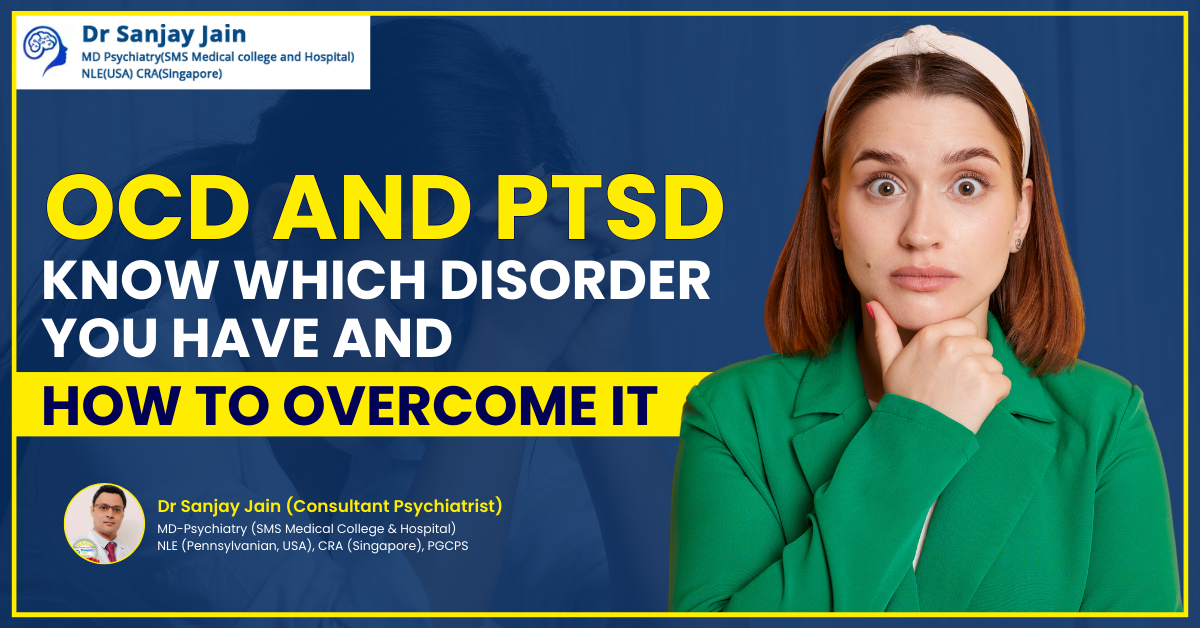
Understanding the Difference Between OCD and PTSD
Are you ever trapped in a never-ending persistent thinking pattern that you’re not able to escape? Or, do you find yourself obsessed with a few things and keep on repeating those again and again, like cleaning or other stuff?
If yes, then these might reflect a few symptoms of OCD (Obsessive-Compulsive Disorder)! Or, if distressing nightmares, memories, and avoiding reminders of a traumatic event are taking over your life, you might be dealing with PTSD (Post-Traumatic Stress Disorder).
If you think you’re the only one suffering from this trapped emotional cycle, NIH claims that.
While both these disorders have major common symptoms, distinguishing between the two remains a prerequisite to setting the path for the right kind of help because each calls for a different healing approach.
And here’s the keynote – You don’t have to tackle this by yourself. OCD and PTSD can be tough, but you’re not alone.
And who do you think can help you through this? Obviously the expert psychiatrists, and psychologists. They’re only the ones who know how to guide an individual in managing these tricky, out-of-control conditions!
Seeking professional help early can make all the difference. To find out more, explore the detailed sections below and take the first step toward understanding and managing OCD and PTSD. Your journey to recovery begins here.
Let’s Know Key The Difference Between OCD and PTSD:
Symptoms of OCD (Obsessive-Compulsive Disorder)
Now that we know the basic details of what OCD is, let’s get into the details of the symptoms to know more! But before that, please note that OCD can be different for every individual, and symptoms for the same may vary from person to person. However, in each case, stress and anxiety remain the same.
Obsessions are like those pesky thoughts that won’t leave you alone. You might recognize some of these:
- The fear of germs and dirt.
- Worries a lot about hurting yourself or someone else.
- Feeling like you’re losing control.
- Thinking you’ve messed something up.
- Always questioning things.
- Having thoughts you wish would just go away.
Compulsions are the things you feel you have to do, over and over, to get rid of that worry. These might sound familiar:
- Washing your hands a bunch of times.
- Checking stuff again and again, like locks or switches.
- Counting things or doing things in a special order.
- Organizing things in a super specific way.
- Collecting lots of stuff you don’t really need.
- Asking others for reassurance constantly.
Read Also: OCD Kya Hai? OCD के लक्षण, प्रकार और ईलाज – Dr. Sanjay Jain
Symptoms of PTSD (Post-Traumatic Stress Disorder)
PTSD symptoms often come in four flavors:
- Intrusive Thoughts and Memories: If you’ve got PTSD, you might find yourself haunted by thoughts, pictures, or flashbacks of the scary event. It’s like a never-ending rerun.
- Avoidance: Sometimes, people with PTSD steer clear of anything that reminds them of the bad stuff – places, people, activities. They might even avoid talking or thinking about it.
- Negative Changes in Mood and Thinking: Feeling down, angry, guilty, or scared is part of the deal. And thinking straight? That’s a struggle. Making decisions or getting a good night’s sleep? Tough.
- Physical and Emotional Reactions: If you’ve got PTSD, you might jump at the slightest sound or get scared easily, accompanied by other real-world effects like tummy troubles, tense muscles, and headaches.
Remember, PTSD symptoms aren’t one-size-fits-all. Some folks have it milder, while others wrestle with more intense symptoms that shake up their daily life.
How to Differentiate Between OCD and PTSD?
| Aspect | OCD (Obsessive-Compulsive Disorder) | PTSD (Post-Traumatic Stress Disorder) |
| Cause | Genetic and environmental factors. | Exposure to a traumatic event. |
| Primary Symptoms | Obsessions and compulsions. | Intrusive thoughts, flashbacks, avoidance behaviors. |
| Obsessions | Repetitive, distressing thoughts. | Intrusive thoughts related to the traumatic event. |
| Compulsions | Repetitive behaviors to reduce anxiety. | Behavioral or mental rituals to cope with trauma. |
| Avoidance Focus | Avoidance to prevent obsessions. | Avoidance to prevent traumatic triggers. |
| Diagnosis | Conducted by mental health professionals. | Diagnosis by mental health experts. |
| Effective Treatment | Cognitive-behavioral therapy (CBT) and exposure therapy. | CBT and exposure therapy, often with medication. |
| Common Obsessions | Repeated checking, and avoidance of triggers. | Trauma-related intrusive thoughts. |
| Common Compulsions | Excessive washing, checking, or counting. | Repeated checking, avoidance of triggers. |
| Common Triggers | Environmental or mental triggers. | Traumatic memories and reminders of the event. |
| Onset Time | Can develop at any age. | Typically follows a traumatic event. |
| Prevalence | About 1-2% of the global population. | Varied, depending on traumatic events. |
| Co-Occurrence | Can co-occur with other disorders. | Often co-occurs with other anxiety and mood disorders. |
- Cause:
OCD often shows up without an apparent reason. It’s like a puzzle of both genes and life experiences coming together to create those nagging thoughts and behaviors.
PTSD, on the other hand, emerges after a traumatic event – it’s like your brain trying to cope with a really scary memory.
- Primary Symptoms:
With OCD, you’re dealing with thoughts that just won’t quit (obsessions) and things you feel you have to do again and again (compulsions). It’s like being stuck in a mental loop.
PTSD takes you back to the traumatic moment through flashbacks, nightmares, and the urge to avoid anything that reminds you of that time.
- Focus of Obsessions:
OCD can throw all sorts of worries at you, like fear of germs, causing harm, or making mistakes.
PTSD locks onto the traumatic memory and plays it over and over in your mind.
- Nature of Compulsions:
OCD makes you do things to ease the worry, from constant handwashing to double-checking locks.
In PTSD, it’s more about checking or avoiding stuff tied to the trauma.
- Avoidance:
OCD leads you to avoid stuff that could trigger those nagging thoughts or actions.
PTSD makes you dodge anything that reminds you of the traumatic event.
- Diagnosis:
To figure out if it’s OCD or PTSD, you’ll need a pro to assess the situation and make the call.
- Effective Treatment:
Both conditions can benefit from talking therapies like CBT, but PTSD might also need some meds to help out.
- Onset Time:
OCD can hit at any age, starting with little quirks and getting more intense.
PTSD usually comes after the trauma, with symptoms showing up fairly quickly.
- Common Obsessions:
With OCD, the obsessions can be all over the place, like worries about dirt or harm.
PTSD keeps bringing you back to thoughts tied to the traumatic event.
- Co-Occurrence:
OCD can hang out with other mental issues, like anxiety or depression.
PTSD often invites other disorders to the party, like general anxiety or mood troubles.
How a Psychiatric Can Help with OCD and PTSD?
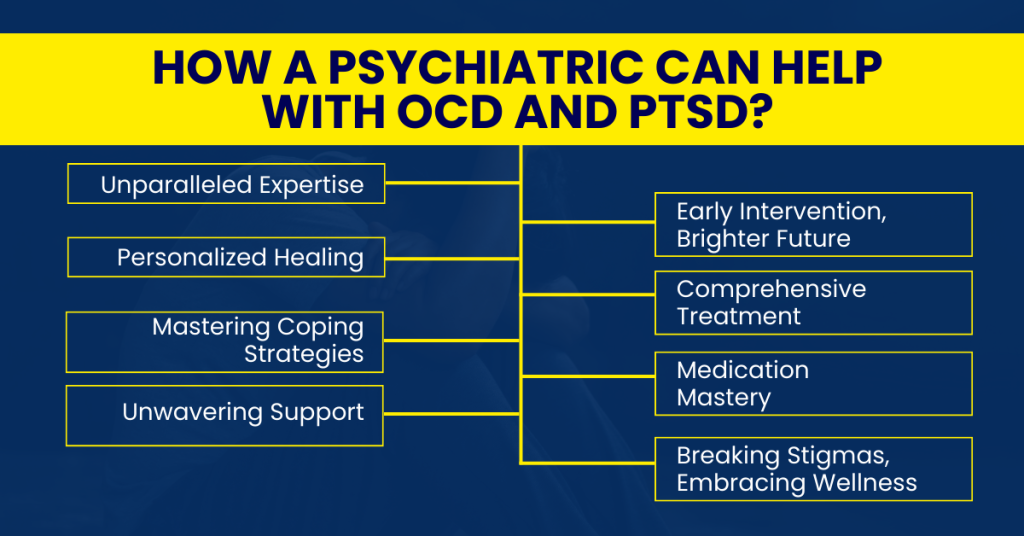
Before we get into the details of how a psychiatrist can help with OCD and PTSD, let’s start by debunking a myth!
In India, there’s a widespread misconception that psychiatric services are solely for severe mental illness, discouraging many from seeking help for conditions like OCD and PTSD. It’s crucial to dispel this myth and stress that consulting a psychiatrist is as ordinary as visiting a general physician.
Mental health is integral to overall well-being, and psychiatric care is designed to aid those dealing with various mental health challenges.
By seeking a psychiatrist’s guidance, you demonstrate self-awareness, strength, and a commitment to personal growth. It’s about fostering a balanced, fulfilling life – a choice that breaks stigmas and promotes better mental health.
Here’s why choosing psychiatric services for OCD and PTSD is the best decision you can make:
- Unparalleled Expertise:
Mental health professionals bring a wealth of expertise to the table. Their in-depth understanding of OCD and PTSD ensures you’re in the most capable hands.
- Personalized Healing:
Your journey to recovery is unique. Psychiatric services offer a tailored treatment plan, designed specifically for your needs and experiences.
- Mastering Coping Strategies:
Conquering the challenges of OCD and PTSD requires effective coping strategies. Psychiatric experts empower you with the tools to manage symptoms and regain control of your life.
- Unwavering Support:
Recovery is a journey best taken with guidance and support. Mental health professionals stand by your side, providing invaluable support and unwavering guidance.
- Early Intervention, Brighter Future:
Swift action leads to brighter outcomes. Psychiatric services detect issues early and initiate timely interventions, laying the foundation for lasting improvement.
- Comprehensive Treatment:
Psychiatric experts craft comprehensive treatment plans, including therapy, medication, and holistic approaches to ensure every facet of your well-being is addressed.
- Medication Mastery:
In cases where medication is necessary, psychiatric services provide expert management and ensure your prescriptions are optimized for the best results.
- Breaking Stigmas, Embracing Wellness:
By choosing psychiatric services, you actively contribute to breaking the stigmas surrounding mental health issues, creating a culture of openness and wellness.
The choice is clear – for unmatched expertise, personalized care, and unwavering support on your path to recovery from OCD and PTSD, opt for psychiatric services. Your well-being is their mission, and together, you can take the journey towards a healthier, brighter future.
Read Also: Why Dr. Sanjay Jain Is The Best Psychiatrist In Jaipur?
Conclusion:
In our journey to understand the human mind, it’s crucial to distinguish between conditions that might seem similar but are inherently different. Take OCD and PTSD, for instance. While both can be deeply distressing, they stem from unique places.
Imagine being trapped in a loop of thoughts and actions—that’s OCD. Now, picture reliving traumatic moments unwillingly—that’s PTSD. Yet, society often wraps these conditions in layers of myths and misunderstandings, making the path to healing even more challenging
In Jaipur, Dr. Sanjay Jain stands out as a leading figure in mental health. He’s not just a psychiatrist; he’s a listener, a guide, and an advocate. Instead of just treating symptoms, he focuses on the person behind them.
With a deep understanding of mental health challenges, Dr. Jain offers tailored treatments for each patient. Beyond his clinic, he’s passionate about educating the public and breaking down myths about mental health. Many in Jaipur see him not just as a doctor, but as a trusted ally in their journey to well-being.
What are you waiting for? Connect with the expert now to know more!
FAQs: Difference Between OCD and PTSD

Dr. Sanjay Jain is a highly qualified and one of the best psychiatrist in Jaipur, India, with over 13 years of experience. He earned his medical degrees from SMS Medical College and Hospital. Dr. Jain is known for his global research work on mental health. He believes in not just using medicine but also educating and working with patients to find the best treatment plan. He was recognized as one of Jaipur’s top psychiatrists in 2020 by threebestrated.com, a trusted US-based ranking company.
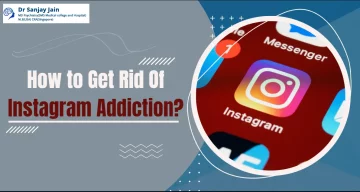
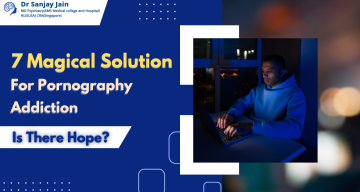
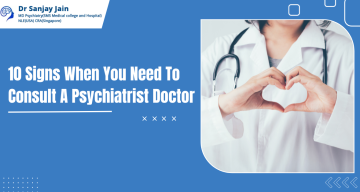
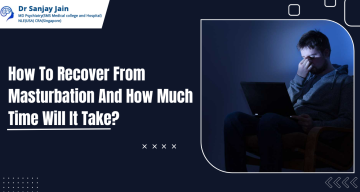
Leave a comment